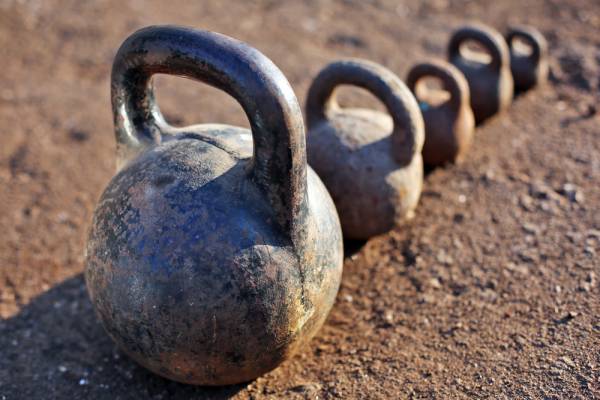When I first sat down to write this it was going to be all about how to pass the RKC. Then I realized that what makes a good RKC is also what makes a good coach in any field. The lessons I’ve learned getting myself and others ready for the RKC are easily transferrable to whatever physical skill you want. So, here are the five biggest lessons about coaching I learned from preparing for the RKC:
1. If you’re a white belt you’re not ready to be a teacher (yet).
While it is technically possible that someone who has never touched a kettlebell before could pass the RKC, it is highly doubtful. They would need to be in superb shape and phenomenal at taking cues and adjusting themselves on the spot. Expecting to pass the RKC as a relative novice is like turning up to a black belt exam as a white belt.
Likewise, if you’re a black belt in karate don’t expect that you’re ready for a black belt in BJJ. Just because you are a CrossFit coach, football coach, or whatever doesn’t mean your skill and knowledge is going to be transferrable to a new area immediately. In the long run your extra knowledge will help your clients, but right now it doesn’t count for much.
2. If you’re a white belt then find a teacher.
If you are new to kettlebells and want to go to the RKC then I strongly urge you to find a teacher – an experienced RKC. Again, while it may be possible to pass the RKC having trained on your own, the number of people who successfully manage to do so are getting slimmer all the time. Even if you are one of the rare few who can manage it you’ll still benefit from hanging out with someone more experienced. You’ll see how he or she writes kettlebell programs, the kinds of results other clients get, who this coach’s clients are, and all manner of small detail items – like how to look after your hands at the certification itself.
If you can’t get in to train with an RKC on a regular basis then I’d strongly suggest attending an HKC or another workshop run by one of the more senior instructors. This gives you an opportunity to see the kind of community you’ll be involved in and whether or not you like the people.
3. Do the reps.
Everything has it’s own little rite of passage. For the RKC it’s the snatch test. For CrossFit it would have to be one of the “girls” (Fran, I’m guessing?). No matter the activity there’s always one thing that people will ask in the “How much do you bench, bro?” kind of way.
So make sure if you are going to be part of that community that you’ve done the reps. Looking at CrossFit with the tough met-con workouts they have I can’t imagine turning up to do Level 1 without having ever experienced the kind of pain associated with them. And if I did, and still managed to walk away from the weekend as a certified instructor, what kind of coach am I going to be with only a weekend of experience under my belt?
 Spending time getting the reps done prior to the event will teach you valuable lessons. I can tell you what happens when you do a workout that involves heavy kettlebell snatches, deadlifts, pull-ups and farmer’s walks (torn hands for the record). I know this because I did it. I can tell you that overhead walks with double bells send clients to therapy for either sore shoulders or necks because most people can’t do them right. This is the kind of thing you learn by doing.
Spending time getting the reps done prior to the event will teach you valuable lessons. I can tell you what happens when you do a workout that involves heavy kettlebell snatches, deadlifts, pull-ups and farmer’s walks (torn hands for the record). I know this because I did it. I can tell you that overhead walks with double bells send clients to therapy for either sore shoulders or necks because most people can’t do them right. This is the kind of thing you learn by doing.
Great instructors are great instructors because they’ve got experience. You just can’t rush experience.
4. Prepare early.
Usually it takes most people about six months to get ready for the RKC if they’re already in moderate shape. The longest it has taken me to get anyone ready is twenty months, though so for some people it can be much longer.
In terms of getting ready, being ready early is always better than stressing about the snatch test right up until you do it on the day. Most of my clients for the November RKC in Australia are ready right now. A few aren’t and we will go right to the wire, but mostly we’re done and my guys and girls can just cruise through the weekend, enjoy it, and take in as much as possible.
The other approach is to try to cram it all in. It might work but it might also leave you gasping and breathless while someone is explaining a great coaching point, and all you can hear is the beating of your own heart in your ears duelling with your gasping breath to see which one gets the most attention. If that means you wait a little longer to attend a certification, so be it. In the long run the extra experience you gain from the extra training will make you a much better coach for your clients.
5. Become a 100% user.
I am stealing this phrase from a former friend who tried to talk me into Amway. It’s always stuck in my head, though, as one of the things he explained to me was that a great way to make the whole system work for you is to use your own products. The RKC has many resources available from books and DVDs, to workshops, to blogs and forums that have the combined experience of many RKCS. CrossFit is no different with its forums and journals either.
 If you’re planning on being an RKC then I suggest learning all you can about the system. Read the books. Attend workshops. Practice the skills. Be a serious student about taking on as much of the system as you can – your clients will benefit greatly. Education is one of the greatest gifts you can give to yourself and time spent reading up on a subject is never wasted (even my time spent on Walking Dead comics so kindly lent to me by one of my customers – good to know how I’ll need to prepare for World War Z).
If you’re planning on being an RKC then I suggest learning all you can about the system. Read the books. Attend workshops. Practice the skills. Be a serious student about taking on as much of the system as you can – your clients will benefit greatly. Education is one of the greatest gifts you can give to yourself and time spent reading up on a subject is never wasted (even my time spent on Walking Dead comics so kindly lent to me by one of my customers – good to know how I’ll need to prepare for World War Z).
To make the most of the RKC you need to immerse yourself in it. The RKC weekend is really only the beginning. Many of the more important realizations about the movements will only become apparent when you either spend hundreds of hours training them or someone more experienced points them out to you. But in either case, you’re going to need to spend time on learning these things.
Being a good coach is not easy. There are many who can physically perform well. There are few who can explain it well. But if you spend time on your education and your own skills practice maybe you’ll be part of that small group too. At the end of it all a good coach isn’t made by what he or she can do, but by what they can help others to do. The key to that is experience. So don’t rush off to become an instructor until you’ve built some experience. It’s great that you’ve been so touched by something that you want to share it with people, but until you actually have a solid grasp of what it is you’re trying to teach you aren’t really going to benefit anyone.
Photos courtesy of Shutterstock.






